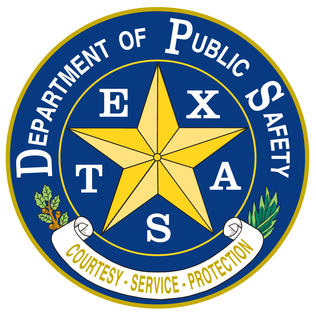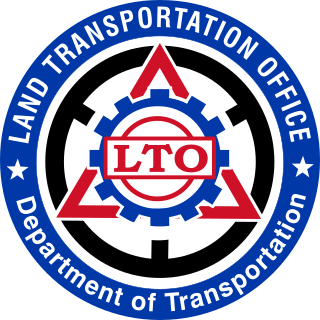In the United States government, independent agencies are agencies that exist outside the federal executive departments and the Executive Office of the President. In a narrower sense, the term refers only to those independent agencies that, while considered part of the executive branch, have regulatory or rulemaking authority and are insulated from presidential control, usually because the president's power to dismiss the agency head or a member is limited.

A department of motor vehicles (DMV) is a government agency that administers motor vehicle registration and driver licensing. In countries with federal states such as in North America, these agencies are generally administered by subnational entities governments, while in unitary states such as many of those in Europe, DMVs are organized nationally by the central government.

The Department of Public Safety of the State of Texas, commonly known as the Texas Department of Public Safety (DPS), is a department of the state government of Texas. The DPS is responsible for statewide law enforcement and driver license administration. The Public Safety Commission oversees the DPS. However, under state law, the Governor of Texas may assume command of the department during a public disaster, riot, insurrection, formation of a dangerous resistance to enforcement of law, or to perform his constitutional duty to enforce law. The commission's five members are appointed by the governor and confirmed by the Texas Senate, to serve without pay for staggered, six-year terms. The commission formulates plans and policies for enforcing criminal, traffic and safety laws, preventing and detecting crime, apprehending law violators, and educating citizens about laws and public safety.
The American Association of Motor Vehicle Administrators (AAMVA) is a non-governmental, voluntary, tax-exempt, nonprofit educational association. AAMVA is a private corporation which strives to develop model programs in motor vehicle administration, police traffic services, and highway safety.

A law enforcement officer (LEO), or police officer or peace officer in North American English, is a public-sector or private-sector employee whose duties primarily involve the enforcement of laws, protecting life & property, keeping the peace, and other public safety related duties. Law enforcement officers are designated certain powers & authority by law to allow them to carry out their responsibilities.

The Texas Education Agency (TEA) is the branch of the government of Texas responsible for public education in Texas in the United States. The agency is headquartered in the William B. Travis State Office Building in downtown Austin. Mike Morath, formerly a member of the Dallas Independent School District's board of trustees, was appointed commissioner of education by Texas Gov. Greg Abbott on December 14, 2015, and began serving on January 4, 2016.

The secretary of state is an official in the state governments of 47 of the 50 states of the United States, as well as Puerto Rico and other U.S. possessions. In Massachusetts, Pennsylvania, and Virginia, this official is called the secretary of the commonwealth. In states that have one, the secretary of state is the chief administrative officer of the state and is often the primary custodian of important state records. In the states of Alaska, Hawaii, and Utah, there is no secretary of state; in those states many duties that a secretary of state might normally execute fall within the domain of the lieutenant governor. Like the lieutenant governor, in most states, the secretary of state is in the line of succession to succeed the governor, in most cases immediately behind the lieutenant governor. In three states with no lieutenant governor as well as the U.S. territory of Puerto Rico, the secretary of state is first in the line of succession in the event of a gubernatorial vacancy.
Law enforcement in Malaysia is performed by numerous law enforcement agencies and primarily the responsibility of the Royal Malaysia Police. Like many federal nations, the nature of the Constitution of Malaysia mandates law and order as a subject of a state, which means that local government bodies also have a role to play in law enforcement, therefore the bulk of the policing lies with the respective states and territories of Malaysia. Below are some of the law enforcement bodies and agencies of Malaysia.

The California Department of Consumer Affairs (DCA) is a department within the California Business, Consumer Services, and Housing Agency. DCA's stated mission is to serve the interests of California's consumers by ensuring a standard of professionalism in key industries and promoting informed consumer practices. The DCA provides the public with information on safe consumer practices, in an effort to protect the public from unscrupulous or unqualified people who promote deceptive products or services.

The Oklahoma Department of Public Safety (ODPS) is a department of the government of Oklahoma. Under the supervision of the Oklahoma Secretary of Public Safety, DPS provides for the safety of Oklahomans and the administration of justice in the state. DPS is responsible for statewide law enforcement, vehicle regulation, homeland security and such other duties as the Governor of Oklahoma may proscribe.

The Land Transportation Franchising and Regulatory Board is an agency of the Republic of the Philippines under the Department of Transportation (DOTr). The LTFRB was established on June 19, 1987, during the former president Corazon Aquino’s administration.

The Land Transportation Office is an agency of the Philippine government under the Department of Transportation responsible for all land transportation in the Philippines. Functions of the LTO include the inspection and registration of motor vehicles, issuance of licenses and permits, enforcement of land transportation rules and regulations, and adjudication of traffic cases.

The California Department of Motor Vehicles (DMV) is the state agency that registers motor vehicles and boats and issues driver licenses in the U.S. state of California. It regulates new car dealers, commercial cargo carriers, private driving schools, and private traffic schools. The DMV works with the superior courts of California to promptly record convictions against driver licenses, and initiates administrative proceedings before its own administrative law judges to suspend or revoke licenses when drivers accumulate excessive convictions. It issues California license plates and driver's licenses. The DMV also issues identification cards to people who request one.
The Texas Commission on Law Enforcement or TCOLE, serves as the regulatory agency for all peace officers in Texas, which includes sheriffs and their deputies, constables and their deputies, police officers, marshals, troopers, Texas Rangers, enforcement agents of the Alcoholic Beverage Commission, investigators of the Attorney General, and game wardens. County jailers and public security officers are also regulated by TCOLE.

A security guard is a person employed by a government or private party to protect the employing party's assets from a variety of hazards by enforcing preventative measures. Security guards do this by maintaining a high-visibility presence to deter illegal and inappropriate actions, looking for signs of crime or other hazards, taking action to minimize damage, and reporting any incidents to their clients and emergency services, as appropriate.

The Florida Department of Law Enforcement (FDLE) is a state-wide investigative law enforcement agency within the state of Florida. The department formally coordinates eight boards, councils, and commissions. FDLE's duties, responsibilities, and procedures are mandated through Chapter 943, Florida Statutes, and Chapter 11, Florida Administrative Code. FDLE is headed by a commissioner who reports to the Florida Cabinet, which is composed of the governor, the attorney general, the chief financial officer, and the commissioner of agriculture. The commissioner is appointed to his position by the governor and cabinet and confirmed by the Florida Senate.

Gun laws in Texas regulate the sale, possession, and use of firearms and ammunition in the U.S. state of Texas.
Criminal records in the United States contain records of arrests, criminal charges and the disposition of those charges. Criminal records are compiled and updated on local, state, and federal levels by government agencies, most often law enforcement agencies. Their primary purpose is to present a comprehensive criminal history for a specific individual.

The Colorado Department of Regulatory Agencies (DORA) is the principal department of the Colorado state government responsible for professional licensing and consumer protection.
The Washington State Department of Licensing (DOL) is a department of the Washington state government that administers vehicle and vessel registration and issues driver's licenses. It also regulates licensing for certain professions, including architects, cosmetologists, geologists, private investigators, real estate brokers, and security guards. The agency also maintains a database of firearms transactions and ownership that is used by law enforcement in the state.













